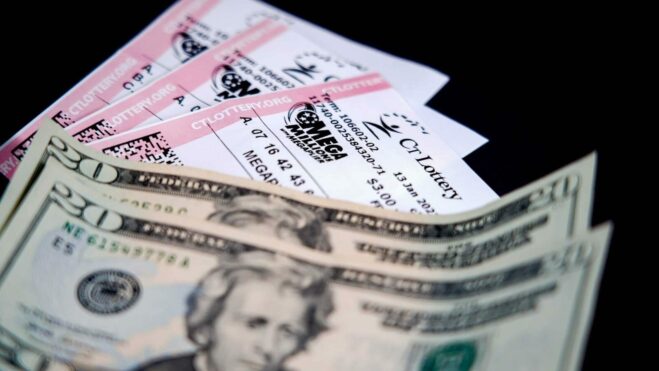These Are The 10 States With The Highest And Lowest Lottery Tax Rates
Interpreted another way: These are the best and worst jurisdictions in which to win the lottery
3 min

So far, 2025 has been a hot year for lottery winners.
Just look at Mega Millions. In 2024, only four times did someone win the jackpot. (Of course, the rarity of wins made the prizes massive, with two jackpots eclipsing $1 billion.)
Meanwhile, in 2025, there have already been three Mega Millions jackpot winners — and jackpots throughout the rest of the year are expected to grow more quickly than they used to, thanks to the new $5 ticket price.
But any lottery jackpot discussion should address the less glamorous reality that often follows the win: taxes. While federal taxes take a uniform cut from the jackpot, state taxes vary dramatically, shaping just how much a winner takes home. Geography can translate to millions of dollars in difference.
Here are the 10 states with the highest lottery jackpot tax rates and the 10 with the lowest, offering a look at how location can change a life-changing win.
1. New York, 10.9%
In New York, the government takes 8.82% of a large lottery jackpot before it ever lands in the player’s account. Then, during tax season, that player will still owe 2.08% more because the jackpot qualifies as income, and the highest income tax bracket is 10.9%.
The federal lottery prize tax is 24%, but players will owe 37% because the income will classify under federal tax rate for large income.
Let’s assume a player wins a $100 million jackpot and takes the lump sum, which would be about $60 million.
So … 37% of that is $22.2 million for federal taxes, and then 10.9% is $6.54 million more for state taxes, leaving $31.26 million in net winnings.
But wait, there’s more: New York keeps an additional cut of the jackpot income if players live in New York City (3.876%) or Yonkers (1.477%). That means a net of $28.93 million in the Big Apple and $30.37 million in Yonkers.
T-2. New Jersey, 10.75%
It’s a similar situation in New Jersey. The state takes 8% before the jackpot gets paid out, and then the winner will owe 2.75% more when they pay income taxes.
A $100 million win would lead to $31.35 million in net winnings.
T-2. Washington, DC, 10.75%
The top three “worst” jurisdictions to win the lottery in the U.S. are all on the East Coast, as the nation’s capital comes in at a tie for second with New Jersey. But, different from Jersey, nothing gets withheld on the original payout and the winners pay a 10.75% state tax on the income when they file their taxes.
The net winnings on a $60 million lump-sum score are the same as New Jersey — $31.35 million.
4. Oregon, 9.9%
Finally, some West Coast flavor.
Oregon withholds 8% right away, and then there’s an additional 1.9% paid during tax season for income. That means the $60 million lump sum becomes $31.86 million after federal and state taxes.
5. Minnesota, 9.85%
Minnesota is the first representative of the Midwest, with 7.25% immediately withheld by the government and the final 2.6% paid when the winner files income taxes. A $60 million lump sum turns into $31.89 million in net winnings.
T-6. Maryland, 8.75%
Maryland is an interesting case, in that it taxes jackpots differently for residents and non-residents.
The state takes 8.75% of a resident’s win right away. Non-residents, however, get 8% of their jackpot withheld and then may still have to pay additional taxes on the jackpot income in their home state. Only Maryland and Arizona withhold lottery taxes from non-resident winners.
A resident’s net winnings would be $32.55 million. A non-resident would net $33 million before paying whatever they’d need to pay in their home state.
T-6. Vermont, 8.75%
Vermont keeps 6% of the lottery jackpot before it’s paid out, and then the winner owes the other 2.75% in income taxes during tax season. The end result: $32.55 million after taxes.
8. Wisconsin, 7.65%
It’s a straight-up 7.65% income tax that lottery jackpot winners need to pay in Wisconsin. So that would be net winnings of $33.21 million.
9. Maine, 7.15%
Over in Maine, the government keeps 5% of your jackpot right away and then takes the final 2.15% when you pay your income taxes. So a Maine winner keeps $33.51 when all is said and done.
10. Connecticut, 6.99%
First of all: Why not just make it 7%? Is that 0.01% making a huge difference?
The entire 6.99% gets taken out at tax season via income, leaving a Connecticut winner with $33.606 million after federal and state taxes. (It would be $33.6 million if the tax rate was 7%.)
8 states don’t take any lottery taxes
You get how this stuff works by now, so we’ll just make the 10 states with the lowest lottery taxes (or none at all) a list.
- T-1. California — 0%, $38.8 million net
- T-1. Florida — 0%, $38.8 million net
- T-1. New Hampshire — 0%, $38.8 million net
- T-1. South Dakota — 0%, $38.8 million net
- T-1. Tennessee — 0%, $38.8 million net
- T-1. Texas — 0%, $38.8 million net
- T-1. Washington — 0%, $38.8 million net
- T-1. Wyoming — 0%, $38.8 million net
- 9. North Dakota — 2.5%, $36.3 million net
- 10. Pennsylvania — 3.07%, $35.958 million net
Seven of the eight states with no lottery tax have no personal income tax of any kind.
In California, meanwhile, a voter-approved referendum from 1984 mandated that all revenue from the California Lottery goes directly toward public education. Taxing winnings may discourage players from playing and sending as much money as possible to education.






